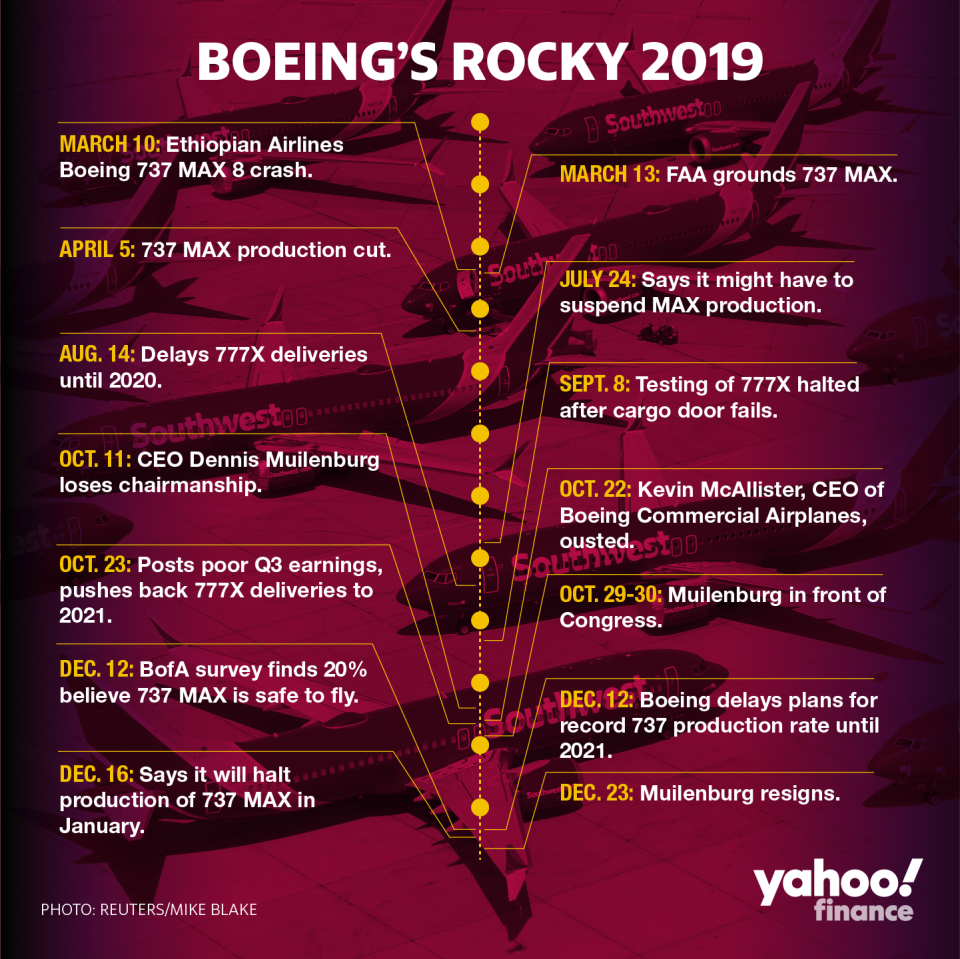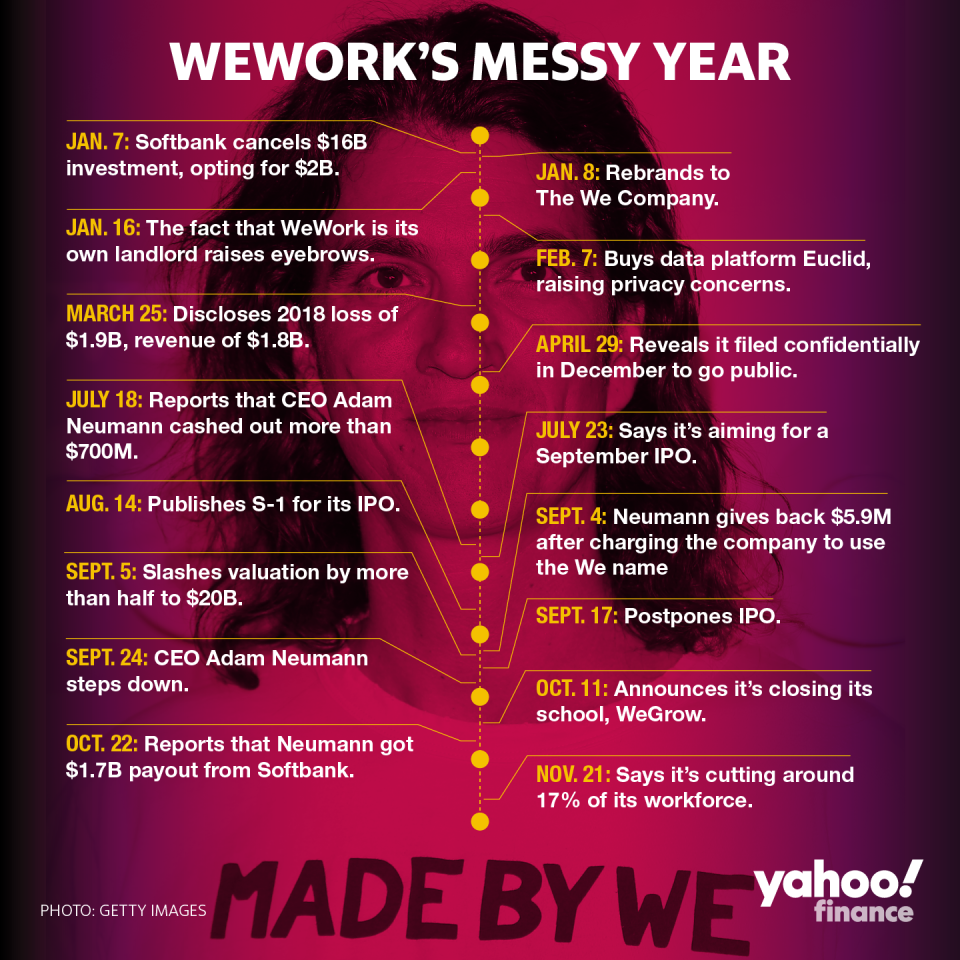Boeing is the worst company of the year, according to Yahoo Finance readers
With strong profit margins and climbing stock price, Target is Yahoo Finance’s company of the year. As Yahoo Finance’s Brian Sozzi put it, the company swims in “shark-infested waters” competing with Amazon and Walmart, but the Minneapolis retailer managed an ambitious turnaround, which has paid off for investors.
Obviously, not all companies fare so well. Readers polled by Yahoo Finance handed the title of Worst Company of the Year to two companies for 2019: Boeing (BA) and WeWork — and it’s not hard to see why.
Boeing is the worst public company of the year, according to readers
Boeing began the year in difficulty, following the crash of Lion Air Flight 610 in Indonesia on Oct. 29, 2018, and the ensuing fallout, including regulatory issues and groundings by airlines. It ended the year in difficulty as well, with a production stoppage and an S&P ratings downgrade in creditworthiness. The ongoing groundings are likely to have long-term effects on Boeing’s profitability and reputation.
A few comments from Yahoo Finance readers:
“They got people killed by skimping on safety.”
“Crashes.”
“Failed to properly instruct users of certain functions of their product which resulted in extreme loss of life.”
“The company was slow to take responsibility for the two fatal crashes that occurred. It had an opportunity to build a completely new plane but instead decided to make minor changes to a plane that was initially built in the 60's so they didn't miss out out on short term profits.”
The company had expected software updates to be announced in January, but a February report from the Wall Street Journal said that discussions of more training and cockpit alerts had stalled fixes.
For whatever reason, the dangers were underestimated by regulators and the airline, and on March 10, another 737 MAX went down — this one 4 months old and from Ethiopian Airlines; 157 people were killed in the crash. Finally, the plane was grounded worldwide. But not after some resistance in the US — it was the last country to ban the planes from the air.
Since then, tales of mismanagement and insufficient oversight emerged. Black-box data showed that the anti-stall system, MCAS, had malfunctioned. Pilots were largely unaware and unfamiliar with the new anti-stall system.

The anti-stall technology had been added late in the design process. Investigators from Indonesia, a multi-agency task force, and the National Transportation Safety Board all faulted Boeing for not instructing pilots and airlines and adequately explaining to regulators how the technology worked. The crashes have shaken the international aviation community’s trust in Boeing as well as the FAA, with reports of corner-cutting adding further bad context.
After many production cuts, Boeing announced a production stoppage on Dec. 16. Boeing had thought the plane would be in the sky before the end of the year, but they remain on the tarmac. All of this is costing Boeing a fortune, around $8 billion so far — and a number that will likely climb. And in a year when the S&P 500 is up over 25%, Boeing’s stock is flat.

It’s a blow to Boeing’s most successful plane, the venerable 737 that is the backbone of many fleets and the entirety of Southwest’s (LUV). In addition to fliers having their flights canceled, airlines have to rethink their schedules in the long term.
The indefinite halt of the 737 MAX production in 2020 will also have a larger macroeconomic effect, a JPMorgan note says.
“We estimate that Boeing’s recent announcement of an indefinite halt in 737 MAX starting in January will have the effect of subtracting around 0.5%-point from 1Q20 annualized real GDP growth,” an analyst wrote.
This problem doesn’t seem to be going away anytime soon. (We should also note that the worst company was voted on before Boeing CEO Dennis Muilenburg was ousted from his role on Dec. 23.)
WeWork: a private (almost public!) honorable mention
As a public company with a market capitalization of over $187 billion, the stakes for Boeing are high. Add the fact that the company makes planes that fly 500 miles per hour at 30,000 feet and carry hundreds of people across continents, and you don’t get much room for error. Boeing failed and 346 people perished.
But Yahoo Finance readers also singled out another company as particularly ignominious — even more than Boeing — an emperor’s-new-clothes-esque story of unchecked founder-first principles, Wall Street financing gone wrong, and a whole lotta crazy.

A few choice quotes from readers:
“Narcissistic-grandiose CEO taking it down. Calling for management to visit him while surfing in Indian Ocean and too busy to be in NY doing IPO roll. Biggest fool of all time!” (To be fair, this “fool” left with over a billion dollars.)
“Couldn't have its IPO; steep decline in Valuation; lack of internal controls; Poor leadership and lax VC [venture capital oversight].”
“What a mess of a company. Not sure what to say. Look at all the drama, the overvalued price, canceled ipo, waste of money, etc.”
WeWork began the year on a bad note, with Masayoshi Son’s Softbank going for a smaller investment than planned. The company soon raised eyebrows with its odd side projects, lofty ambitions, and other projects that seemed to distract from the main point that the company was likely losing a lot of money — confirmed in March — $1.9 billion, with revenue of $1.8 billion.
The messiah-like behavior of WeWork founder and CEO Adam Neumann, which included various instances of apparent self-dealing (charging the company for the name; being its own landlord), began a snowball of questions that culminated with its S-1 filing for its IPO, which revealed a questionable structure of corporate governance in which Neumann could exercise control from beyond the grave.

The company, which began 2019 with a valuation of around $36 billion, did not do well under the public relations issues and slashed valuation to $20 billion in early September before postponing its IPO.
Neumann’s ouster on Sept. 17 stemmed the bleeding, though the $1.7 billion golden parachute amid the specter of mass layoffs dealt even more blows to the company’s image as a parody of a startup gone wrong.
Eventually Softbank bailed WeWork out with a $9.5 billion rescue package, sinking WeWork’s valuation to $8 billion.
WeWork pointed Yahoo Finance to a statement the company had made about its strategy going forward, which actually makes some sense.
Yahoo Finance readers, however, are mostly skeptical that it can fix itself for 2020. A few comments:
“The damage is done.”
“No more access to equity. Reputation is permanently damaged.”
“With the CEO out there is potential for a comeback, but at the end of the day it's a real estate arbitrage company that assumes all the risk for a small profit margin.”
With discipline, the business seems like it could work and provide a useful service to companies that are trying to scale quickly. But probably not as a “tech company” with a $47 billion valuation (the highest in its history).
-
Ethan Wolff-Mann is a writer at Yahoo Finance focusing on consumer issues, personal finance, retail, airlines, and more. Follow him on Twitter @ewolffmann.
Bank of America will pay people $15 to use its app
Companies are secretly scoring you, but good luck getting your data
This is the worst deal on Cyber Monday
'Snake oil salesmen': Two neurologists respond to the CBD craze
Large-scale credit card hackers back for the holiday season, ex-FBI investigator says
Read the latest financial and business news from Yahoo Finance
Follow Yahoo Finance on Twitter, Facebook, Instagram, Flipboard, LinkedIn, YouTube, and reddit.
This article was updated on Dec. 23, 2019.